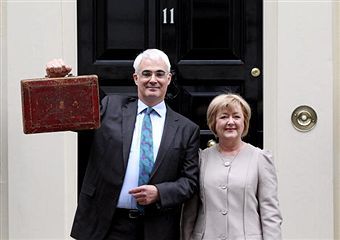 It’s unusual for Chancellors to stand with their wives on the steps of the Treasury on budget day, and to see the Darlings together this morning gives an indication of what they have been through. Brown doubtless thought him an automaton when he appointed him to the job – but I was wrong to say that he would be “no more a Chancellor than Captain Scarlett was an actor”.
It’s unusual for Chancellors to stand with their wives on the steps of the Treasury on budget day, and to see the Darlings together this morning gives an indication of what they have been through. Brown doubtless thought him an automaton when he appointed him to the job – but I was wrong to say that he would be “no more a Chancellor than Captain Scarlett was an actor”.
He has defied Brown, bringing moderation and much-needed dullness to the worst fiscal crisis in Britain’s peacetime history. In James’s political column last week he suggested that Darling calls his autobiography “the forces of hell” – that he would defy Brown like that takes some guts. It felt strange to praise Darling in the editorial of tomorrow’s magazine, given that he has presided over this fiscal collapse. But working within the parameters, I do believe he did the best he could.
Today’s Budget meant almost nothing, unless you are a cider-drinking Belize resident about to buy a flat for £200,000. I feel for the newspapers who have set aside 12 pages of “what this budget means for you” – the answer is nothing. It was a strange reversal: this Budget was the non-event that the Pre-Budget Report is supposed to be. And the PBR had been hyped into a mini Budget. But I have spent hours trawling the Red Book, looking out for the tricks and deceits that Brown put in there when his idea of a successful Budget was one that deceived the media. Darling’s appears to be clear. No deceptions. His speech contained it all.
Perhaps this is the Treasury reasserting itself, in preparation for a Tory government. The Treasury will want yet again to become seen – in Britain and abroad – as a bastion of fiscal probity rather than the Arthur Daley Department for Debt Concealment.
What Brown and Balls made the Treasury do in recent years is a scandal. As we say in the Spectator editorial tomorrow, Cameron’s Robert Maxwell analogy did not go far enough. Brown hedged bets more recklessly than Nick Leeson, concealed more debt than Enron, and was a worse regulator of the behaviour of bankers than Fred Goodwin. But as for Darling, no such accusation can be levelled against him. He is that rare thing: a minister who realises that he is appointed by the Queen rather than the Prime Minister, and that his duty is to the country rather than the party.
In his time in office, Darling has transformed Britain’s debt outlook for a generation – for the worse. He has operated within the parameters of a traduced Treasury using dodgy debt concealment devices cooked up by Brown and Balls. But, crucially, from the moment he arrived as Chancellor, Darling levelled with the public. He told it straight. Unless the IFS find something tomorrow, he seems to have played it straight today – while doubtless under huge pressure to do otherwise. When he leaves the Treasury for good – in about five weeks time – he can do so with his head held high.







Comments